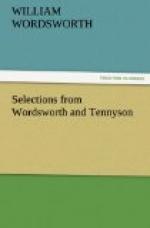An important incident in his life, hardly second in importance to the stimulating companionship of his sister, was his meeting with Coleridge, which occurred probably towards the close of 1795. Coleridge, who was but little younger than Wordsworth, had the more richly equipped, if not the more richly endowed, mind. He was living at Nether Stowey, and in order to benefit by the stimulus which such a friendship offered, the Wordsworth’s moved to Alfoxden, three miles away from Stowey (July, 1797). It was during a walking expedition to the Quantock Hills in November of that year that the poem of The Ancient Mariner was planned. It was intended that the poem should be a joint production, but Wordsworth’s contribution was confined to the suggestion of a few details merely, and some scattered lines which are indicated in the notes to that poem. Their poetic theories were soon to take definite shape in the publication of the famous Lyrical Ballads (September, 1798), to which Coleridge contributed The Ancient Mariner, and Wordsworth some characteristic lyrical, reflective, and narrative poems. The excessive simplicity and alleged triviality of some of these poems long continued to give offence to the conservative lovers of poetry. Even to-day we feel that Wordsworth was sometimes the victim of his own theories.
In June of this same year (1798) Wordsworth and his sister accompanied Coleridge to Germany. They soon parted company, the Wordsworths settling at Goslar, while Coleridge, intent upon study, went in search of German metaphysics at Gottingen. Wordsworth did not come into any contract with German life or thought, but sat through the winter by a stove writing poems for a second edition of the Lyrical Ballads. April, 1799, found the brother and sister again in England. In December they settled down at Dove Cottage, Town End, Grasmere, and never, save for brief intervals, abandoned the Lake Country. In 1802, as has been said, a slight accession of fortune fell to Wordsworth by the settlement of the Lonsdale claim. The share of each of the family was 1,800 pounds. On the strength of this wind-fall the poet felt that he might marry, and accordingly brought home Mary Hutchinson as his wife.
The subsequent career of Wordsworth belongs to the history of poetry. Of events in the ordinary sense there are few to record. He successively occupies three houses in the Lake Country after abandoning Dove Cottage. We find him at Allan Bank in 1808, in the Parsonage at Grasmere in 1810, and at Rydal Mount from 1813 to his death in 1850. He makes occasional excursions to Scotland or the Continent, and at long intervals visits London, where Carlyle sees him and records his vivid impressions. For many years Wordsworth enjoys the sinecure of Distributor of Stamps for Westmoreland (400 pounds a year), and on his resignation of that office in his son’s favor, he is placed on the Civil List for a well deserved pension of 300 pounds. On Southey’s death, in 1843, he is appointed Poet Laureate. He died at Grasmere on April 23rd, 1850.




